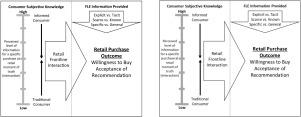Journal of Retailing ( IF 8.0 ) Pub Date : 2021-01-27 , DOI: 10.1016/j.jretai.2020.10.003 Bryan Hochstein , Willy Bolander , Brett Christenson , Alexander B. Pratt , Kristy Reynolds

|
It is no secret that the consumer journey produces retail consumers who have varying levels of subjective knowledge about a purchase prior to a retail interaction. This observation leads to a common conclusion that the need for frontline employees (FLEs) in retail environments is diminishing. Nevertheless, retailers invest heavily in staffing and training FLEs. As such, understanding pre-encounter subjective knowledge and how FLEs should address it is critical, yet the topic is largely overlooked in the marketing literature. Thus, we investigate consumer subjective knowledge via an information diagnosticity lens to provide guidance on how subjective knowledge operates when the information in question is scarce/known, tacit/explicit, and specific/general. The results of three experiments reveal consumers can be classified as traditional, well-calibrated, or poorly-calibrated based on their subjective knowledge prior to meeting with an FLE – with each type requiring different FLE approaches to improve both consumers’ willingness to buy and acceptance of FLE recommendations.
中文翻译:

一线互动中消费者主观知识调查
消费者旅程产生的零售消费者在零售互动之前对购买具有不同程度的主观知识,这已经不是什么秘密了。这一观察导致了一个共同的结论,即零售环境中对一线员工 (FLE) 的需求正在减少。然而,零售商在人员配备和培训 FLE 方面进行了大量投资。因此,了解遭遇前的主观知识以及 FLE 应如何解决它是至关重要的,但该主题在营销文献中却被很大程度上忽略了。因此,我们通过信息诊断性镜头调查消费者主观知识,以提供有关当所讨论的信息稀缺/已知、隐性/显性和特定/一般时主观知识如何运作的指导。三项实验的结果表明,消费者可以分为传统的、











































 京公网安备 11010802027423号
京公网安备 11010802027423号